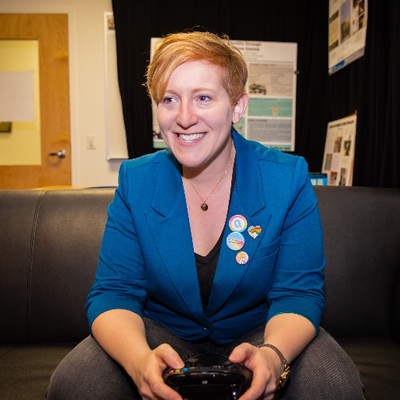Last week’s Queerness and Games Conference was more inspiring than we organizers ever could have imagined. During our final session, where we discussed the future of queerness and games, many participants expressed interest in starting conferences like QGCon in their own communities and/or universities. That is rad. After nine months of making QGCon a reality, there’s a lot of nitty-gritty insight into the process that I’d like to share, in the hopes that we can make your road to organizing a shoestring game conference a little less mysterious. So let’s talk about money,
One thing to remember before I toss out a bunch of numbers: the Queerness and Games Conference was free, free-ity, free. Huzzah for financial inclusivity! However, that meant that none of our funding came from ticket sales (though, if we had it to do again, we would have added the EventBrite “donate” button to our site much sooner). As a basic comparison, here is how the cost of attending QGCon compared to the cost of other popular 2013 games conferences:
Game Developer’s Conference, all-access pass: $2,100
Indie Cade, all-access pass: $450
Penny Arcade Expo, four-day pass: $95
GaymerX, three-day pass: $70
Different Games: free
Lost Levels: free
Given that, we’re particularly proud that we pulled off the following budget, though admittedly by the skin our teeth. First off, here is a list of everything that we spent money on:
$1,400: keynote speaker (travel and accommodations covered)
$400: featured speakers (travel and accommodations partially covered)
$1,250: space rental (technically one lecture hall and one classroom, but we really a whole building)
$300: printing (posters, post cards, 200 programs)
$65: assorted materials (name badges, plates and napkins)
$420: breakfast Saturday and Sunday (coffee, bagels, and fruit for 40)
$510: lunch for speakers/volunteers Saturday and Sunday (burritos for 30)
$200: dinner for night games (pizza for 50)
$540: speaker and volunteer dinner (Mexican food buffet for 40)
$95: drinks (wine, bottled water, soda)
—Total spent: $5,180
You’ll notice that a large chunk of our budget went into food. On first glance, that might seem unnecessary ($200 for pizza?). However, it was important to us to promote conviviality and a sense of community. Providing meals encouraged people to spend more time at the event space. It also allowed speakers and volunteers to grab food between sessions without stressing about local eating options. Plus, free food made the conference more financially accessible to speakers and attendees from out of town. Another large chunk of our funds went to speakers. It was important to us, as much as possible, to use our funding to promote accessibility and diversity, which meant finding ways to include participants from beyond the Bay Area.
Where did we get that money? All of our funding came from academic departments on UC Berkeley campus. If you’re also looking for university funding, we recommend searching widely; think interdisciplinary. Some departments will likely shake their heads at your silly games. Others will like the snazzy idea of a games conference. Keep on pushing and prodding, and eventually the numbers will add up. Note: despite some concerns about corporate presence at the event, we did approach a handful of games companies for support. All of them turned us down, even those with dedicated “diversity” departments. Here is where our money ultimately came from:
$1,210: Berkeley Center for New Media
$1,500: Dean of Arts and Humanities
$500: Townsend Center for Humanities
$500: Department of Film & Media
$500: School of Information
$400: German Department
$200: New Media Working Group
$200: Comparative Literature Department
$100: Gender & Women’s Studies Department
—Total funding: $5,110
Anecdotal evidence from conversations I’ve had with grad students organizing conferences on more traditional topics tells me that $5,000 is in the low-to-middle for a weekend-long event. These other conferences also included significantly fewer speakers and participants (and significantly less tasty pizza). If you were operating on an even smaller budget, you could 1) spring for less food, 2) try to find a space that’s donated instead of rented and 3) do less dead-tree printing and offer more purely web-based materials.
Given the modest nature of our funding, we got creative in a few places to help keep our costs down. First, we arranged home stays with friends instead of stipends for our speakers who needed help with accommodations. Next, we printed a lot of our less formal materials on a departmental printer. In terms of people hours, we had an enormous amount of support from a core of volunteers, whose expertise replaced the cost of A/V help, etc. Finally, we ended up cutting out one of our free food moments — the closing reception, which was supposed to have wine, cheese, etc. Instead, we announced to the crowd that we were our of money (seriously), but that they should feel free to hang out, chat, and enjoy each other’s already intoxicating company.
Next time around, assuming there is a next time around (fingers crossed), we’re hoping that the success of QGCon 2013 will help us raise funds with a bit more eeeeeeease. In the mean time, though, we are grateful to all of our sponsors, our volunteers, our speakers — and everyone who made the Queerness and Games Conference amazing, even on a shoestring budget!

